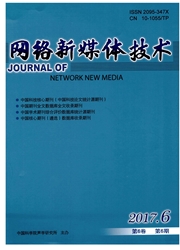

 中文摘要:
中文摘要:
针对汉语语音关键词检索任务中的集外词检索提出了一种基于局部声学信息的改进算法。在汉语语音识别和语音关键词检索任务中,由于集外词可以由词典内部的字词组合而成,因而通常认为不存在类似英文等语言中的集外词检索的问题。然而,由于数据稀疏问题,集外词在语言模型上建模不够充分,导致解码过程中难以存留下包含集外词的路径。本文根据深度神经网络在声学模型上建模的准确性,提出了在解码过程中利用令牌保存的局部声学信息以保留那些局部声学概率高而即将被剪枝掉的令牌,从而在词图中保留下来包含集外词的路径,提高集外词检索的召回率;然后再利用关键词置信度重估技术提高集外词检索的精度。实验表明,利用解码过程中的局部声学信息可以提高集外词检索的性能,召回率相对于基线系统有10%的绝对提高;在高精度区,使用置信度重估后本文提出的方法同样取得显著提高。
 英文摘要:
英文摘要:
Out of vocabulary (OOV) word detection is an important issue in spoken term detection (STD). Unlike the detection of OOV words in English, Mandarin OOV words can be composed of in - vocabulary words and are considered less influential. However, due to data scarcity, the language model probabilities for OOV words is relative low and the paths containing OOV words at the deco- ding stage cannot be preserved. In this paper, the use of integration with local acoustic information is investigated to retrieve more OOV words. Tokens with high acoustic probabilities in the search space will be forced to propagate to the next frame. In this way, acoustic similar words can be reserved in the recognition results. Experimental results show that this new approach results in 10% absolute to the baseline system and the improvement is also significant in the high precision area.
 同期刊论文项目
同期刊论文项目
 同项目期刊论文
同项目期刊论文
 A Comparative Study on Selecting Acoustic Modeling Units in Deep Neural Networks based Large Vocabul
A Comparative Study on Selecting Acoustic Modeling Units in Deep Neural Networks based Large Vocabul A Novel Multichannel Audio Signal Compressing Method Based on Tensor Representation and Decompositio
A Novel Multichannel Audio Signal Compressing Method Based on Tensor Representation and Decompositio Context-based adaptive arithmetic coding in time and frequency domain for the lossless compression o
Context-based adaptive arithmetic coding in time and frequency domain for the lossless compression o Objective and Subjective Investigation on a Novel Method for Digital Reverberator Parameters Estimat
Objective and Subjective Investigation on a Novel Method for Digital Reverberator Parameters Estimat 期刊信息
期刊信息
